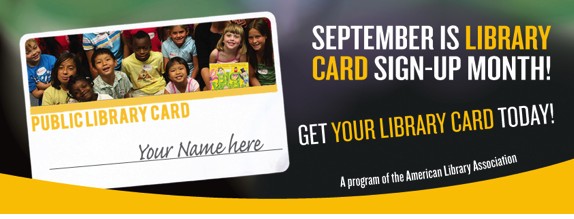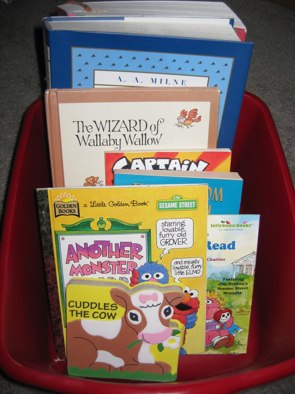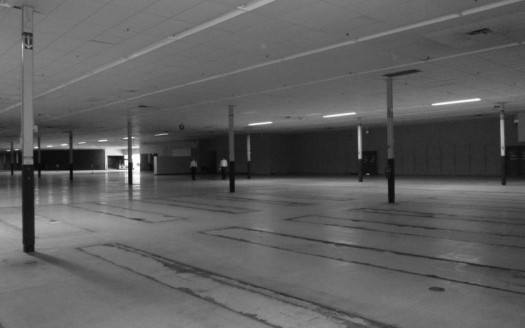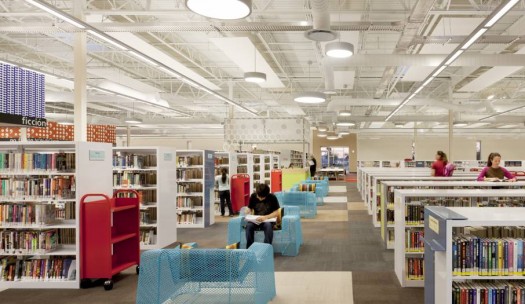Paper Doll Celebrates National Library Card Sign-Up Month

Paper Doll‘s first job was as a page at the Clearfield Branch of the Erie County Public Library — the perfect stomping grounds for a Professional-Organizer-in-Training. Granted, the value of some skills (like maneuvering through a card catalog) might prove negligible as the 21st century progresses (unless we face a Revolution-like, world-wide loss of power).
But I still marvel at systems I now use professionally, like organizing toddler books front-outward in dishpans (like how albums used to be displayed in record stores) so that little hands can flip each book forward or backward without destroying a bookshelf. After all, toddlers can’t read, so the spines of books are fairly useless to them; a series of dishpans (filled with vertically arrayed, face-out books) lets little ones tidily access any covers that strike their fancies.

From a professional organizer’s perspective, the best thing about libraries is the opportunity to allow yourself to trust that you need not maintain the entire world at your house. Those four hundred issues of National Geographic making your guest room floor buckle, but which you never approach except to dust and sigh? The library has them, too, for whenever you want to learn about the mating habits of the elephants of the Serengeti…and you’ll never have to dust them. (The Nat Geos, not the elephants. Well, those too.)
Of course, I’m not saying to give up purchasing books and magazines, but understand that there’s an alternative to becoming an accidental collector of books you’ll never read (or never read again). If you are overwhelmed by clutter in your space, but have a voracious hunger to read (or listen to music, or watch movies), check your public library’s collections first before running off to Amazon or your local bookseller or shopping mall.
The biggest lesson I learned is that a library is a treasure-trove of resources that most patrons never explore. Sure, people know about the books and magazines, and nowadays, movies. But our friends at the American Library Association have put together a slide show of ways to put your library card to work for you.
(Not a fan of slide shows? Review all 60 suggestions in list form.)
So, what magical powers does your library card bestow? Your library card, what bibliophiles and library peeps like to call “the smartest card in your wallet,” grants access to a vast array of offerings.
ITEMS TO BORROW
Although some special collections and reference materials can only be read in-house, the majority of tangible items at libraries can be borrowed and taken home for at least a week, and sometimes up to a month, including:
- Books in print and audio books on tapes and CDs
- Electronic books and digital magazines available through digital download services like Overdrive, OneClick Digital, TumbleBooks and Zinio
- Magazines and trade journals
- Graphic novels and comic books
- DVDs (including exercise and how-to books)
- CDs
- Phonograph records (yes, really!)
- Sheet music
- Museum passes — Call ahead to see what museum passes your library maintains and ascertain whether you’ll need to make reservations.
Other items may be available for same-day, in-library borrowing, such as:
- Board games
- Classic games, like chess, checkers and backgammon
- Computer and video games
- Video game controllers
- Headphones
Remember, your library is likely to be a member of one or more library systems through which you can request an interlibrary loan.
You can also reserve materials that are currently out (or at another branch). In most cases, if your library is able to send you a digital notification of a reserved item’s availability, there will be no charge; for older libraries still using postcard systems, your reservation may be about the cost of a postage stamp.
FREE SERVICES
Computer Access — At most public libraries, computer access is free; you’ll only pay for pages you choose to print.
Wi-Fi and Wired Internet Access — Not everyone has high speed internet access, and though it might seem otherwise, less than 49% of Americans have smart phones. Internet access is not ubiquitous. Get connected!
Database Access — Public libraries subscribe to an amazing array of genealogical, financial, medical, legal and other databases (including LexisNexis, PsychInfo, EBSCO — even the Chilton Auto Repair Database!) which are made available to patrons. Need work? Libraries are a superb source of employment guidance and job search databases.
Tech Support — Many libraries offer free courses in basic computer and web skills. Also, most librarians are able to provide guidance on common computer issues.
Test Prep — Public libraries provide online access to subscription databases for SAT, GRE, LSAT and other practice standardized tests.
Homework Help — Librarians won’t do your children’s homework, but they’re fonts of information regarding selection of the appropriate resources. Many public libraries also have homework assistance hot-lines and online homework help.
Tax Prep Assistance — Libraries don’t supply tax advice directly, but AARP and other community organizations provide volunteer, pro-bono tax preparation assistance at most branches.
Delivery — Not everyone is able to get to the library. Elderly, housebound or disabled patrons can often request to have library materials delivered to them. Contact your local library for available resources and review the offerings of the National Library Service for the Blind and Handicapped.
Children’s Entertainment — Public libraries have story hours, magic shows, movies, puppet shows, arts and craft activities and other events to keep children engaged while giving parents some breathing space.
LOW-COST SERVICES
In addition to the wide variety of free services provided by libraries, a number of services are supplied at limited costs. These include:
Faxing
Photocopying
Printing
Scanning
Notary Services — Call your library branch in advance to find out if and when the services of a notary public will be available.
Passport Services — Often the largest branch in a library system will assist with passport application processing.
Book Sales — Public library funding is always challenging. To bolster financial resources, libraries accept donations of books, magazines and digital materials for resale at periodic sales. Declutter throughout the year, letting go of items you know you’ll never access again, and add to the library’s coffers. If you’ve got adequate willpower, peruse the book sales for low prices on titles you can’t find elsewhere.
MEETING SPACES
Libraries maintain private rooms for not-for-profit endeavors, including:
Book Clubs
Game Groups
Community Meetings
Guest Lectures and Classes (Last summer, Paper Doll took courses in origami and how to use the library’s electronic book borrowing systems. It’s safe to say I’m more proficient at the latter than the former.)
QUIET SPACES
Some days, you just need to get away from the kids or the office and find a quiet space to write your novel, balance your checkbook or think through your life issues. Libraries are safe, temperature-controlled, and, unless you’re sitting right next to the children’s area, fairly serene.
THIS IS NOT YOUR GRANDMA’S LIBRARY
Haunted by the memories of the stuffy, dusty libraries of your childhood? The days of Marian the Librarian are long gone. Nowadays, Librarians Do Gaga, and libraries show up in the darnedest places, like abandoned Walmarts.


(For more, check out Flavorwire’s 10 Wonderful Libraries Repurposed from Unused Structures.)
Library services have gotten creative. Some let patrons “borrow” dogs so that reluctant young readers can practice their skills by reading to nonjudgmental and snuggle-able canines. Others libraries participate in HumanLibrary.org and other programs where you can “check out” a volunteer expert.
RETURN ON INVESTMENT
Still not sure what the library can offer you? How about saving and organizing those little green pieces of paper in your wallet? This simple worksheet will automatically calculate the financial value of your library card in terms of annual savings. (The cognitive, emotional and societal values are immeasurable, of course.)
GET YOUR LIBRARY CARD
I always ask new clients, “Do you have a calendar? A file system? A will? A fire extinguisher?” On the advice of librarian extraordinaire Jessamyn West, I’ll now be asking, “Do you have a library card?”
National Library Card Sign-Up Month is the perfect time to get a card for yourself or your kids. (Check out DotMomming‘s Kate Hannigan’s motivating, heartwarming tale of getting her son his first library card.)
1) Locate your public library.
2) Fill out an application, available at your branch or on most public library web sites.
3) Show valid ID with your current address. If you’re new to town and don’t yet have an ID bearing your address, most libraries will accept two items bearing your name and street address (but not PO box), such as current utility bills (e.g., telephone, gas, electric or cable), personal checks, voter registration cards, and other mail with postmarks from the past 30 days.
4) Use your new library card often. Plan a weekly visit with your family and explore your library’s offerings.
5) Set up a Library Shelf in your house where all the items you borrow from the public library “live” when they’re not being read or used. Having a set location where library items belong when not in use prevents them from going missing and assures you’ll be able to return them on time. (Don’t have a regularly-scheduled library day? When you check out your items, note the due date in your task app or on your calendar.)
DON’T FORGET TO GO DIGITAL
Once you’ve got your library card, be sure to set up your online library account. This will allow you to reserve/request items, renew items and check your due dates, all from the comfort of your own home.
Please, share your library stories. What do you love most about your library? Do you remember getting your first card? (Little could Paper Mommy have realized that one visit to the public library when I was three could have led to both my first job and my latest blog post.)




Follow Me